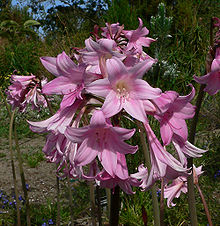Amaryllidoideae
| Amaryllidoideae | |
|---|---|
 |
|
| Amaryllis belladonna | |
| Scientific classification | |
| Kingdom: | Plantae |
| Clade: | Angiosperms |
| Clade: | Monocots |
| Order: | Asparagales |
| Family: | Amaryllidaceae |
| Subfamily: | Amaryllidoideae |
| Type genus | |
|
Amaryllis L. |
|
| Tribes | |
|
See text |
|
| Synonyms | |
|
|
See text
Amaryllidoideae (Amaryllidaceae s.s., amaryllids) is a subfamily of monocot flowering plants in the family Amaryllidaceae, order Asparagales. The most recent APG classification, APG III, takes a broad view of the Amaryllidaceae, which then has three subfamilies, one of which is Amaryllidoideae (the old family Amaryllidaceae), and the others are Allioideae (the old family Alliaceae) and Agapanthoideae (the old family Agapanthaceae). The subfamily consists of about seventy genera, with over eight hundred species, and a worldwide distribution.
The Amaryllidoideae are herbaceous, perennial flowering plants, usually with bulbs (some are rhizomatous). Their fleshy leaves are arranged in two vertical columns, and their flowers are large. Most of them are bulbous geophytes and many have a long history of cultivation as ornamental plants. They are distinguished from the other two Amaryllidaceae subfamilies (Agapanthoideae and Allioideae) by their unique alkaloidal chemistry, inferior ovary, and hollow style.
...
Wikipedia
